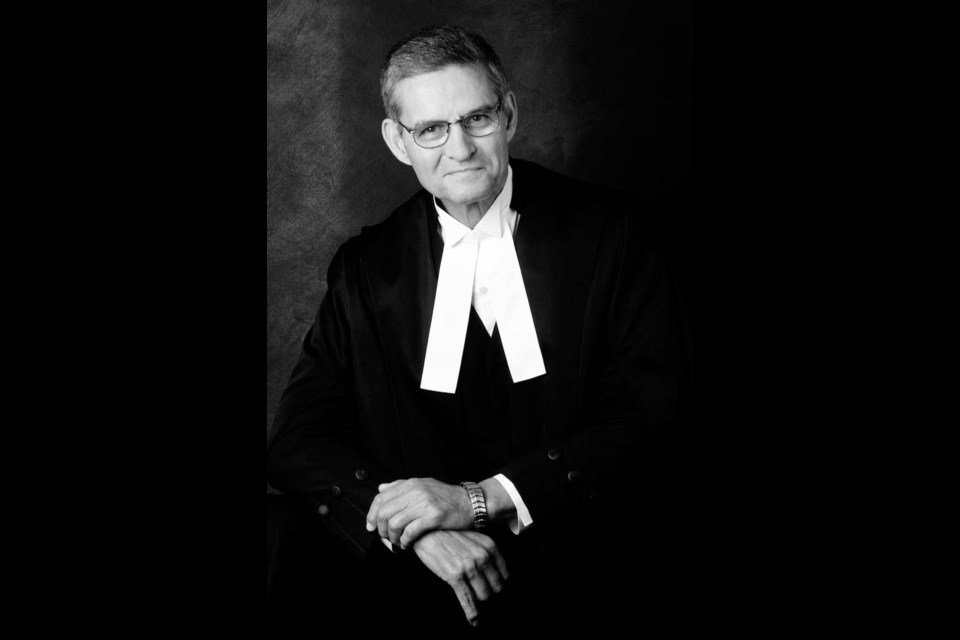On Aug. 30, Lance Finch died at 82. News reports have listed his many accomplishments and honours, culminating in his appointment as Chief Justice of British Columbia in 2001, a post he held until his retirement in 2013.
This followed the sad news that Joseph Gosnell, president of the Nisga’a Tribal Council from 1992 until 2000 and then, after the ratification of the historic Nisga’a Treaty, president of the Nisga’a Lisims government from 2000 until 2004, had died at the age of 84 just two weeks before.
Gosnell was president of the tribal council during the negotiation of the landmark Nisga’a Treaty — the first modern treaty in British Columbia.
What we would like to commemorate is their participation in a truly historic moment at the University of Victoria in 2003.
That year marked the 30th anniversary of the Calder case, in which the Supreme Court of Canada ruled that Aboriginal title is a part of Canadian law. This decision prompted, throughout Canada, the comprehensive land claims process that is ongoing today.
A number of us thought this anniversary should be marked with a conference, one that after two days of presentations and discussion would end with a celebration in the University Centre of both the Calder case and the recently concluded Nisga’a Treaty.
We invited Frank Calder, Rod Robinson and Hubert Doolan, the three surviving members, at the time, of the Nisga’a plaintiffs who had initiated the case in 1968; Nisga’a President Joe Gosnell (younger brother of another of the Calder plaintiffs, James Gosnell); Lieutenant- Governor Iona Campagnolo; B.C. Chief Justice Lance Finch; and the Nisga’a Ts’amiks Dancers. The event was hosted by David Turpin, the president of the university.
This was a historic occasion. The provincial Crown and the judiciary joined with Nisga’a and other Indigenous leaders to affirm publicly the place of Aboriginal title in Canadian law and to celebrate the process that the Nisga’a began in 1887 and that ended more than a century later with ratification of the Nisga’a Final Agreement. Finch and Gosnell participated enthusiastically.
And what truly sticks in our memories is this: before each guest addressed the audience, they entered the stage dancing in procession, following Nisga’a protocols, to the drumming and singing of the Ts’amiks Dancers. For beginners, the lieutenant governor and the chief justice proved pretty good.
Finch sought to sustain, through his career, that momentum for reconciliation. He argued, in his gentle but effective way, that we should respect and draw upon Indigenous law. He strove to broaden the foundation of the Canadian legal order so that all British Columbians could willingly adhere to it and see it as an expression of their various societies.
And Gosnell, a commercial fisher throughout his life, was one of generations of immensely talented Nisga’a leaders who affirmed their rights to the land and who worked to have those rights recognized. When the Nisga’a Treaty was ratified by the Parliament of Canada, Gosnell and other Nisga’a representatives rose in the gallery to join in singing O Canada. For them, the treaty was not about negotiating their way out of Canada; it was about negotiating their way in.
Earlier in the conference, Frank Calder and his lawyer, Tom Berger, participated in a discussion in front of a large audience. Calder was asked how he felt about the Supreme Court of Canada’s decision 30 years earlier. He replied that it was “a major victory,” and explained:
“You see, we didn’t establish the Indian reservations. Those guys that we faced in court, they did it … To confine people inside that boundary, you have to be on top of them. You’re both in the gutter. Right? If somebody’s holding down that First Nation inside that reservation, somebody’s got to be on his back and that guy on his back is controlling the law books. So the … decision meant that he had to get off my back and we’d turn around and face each other and talk. That was the birth of the negotiations, which in my book is the major No. 1 victory of the Calder case.”
Calder, Robinson and Doolan passed on some years ago. Now Gosnell and Finch have joined them.
Their many contributions to truth and reconciliation, including their heartfelt remarks at the Calder conference 17 years ago, deserve acknowledgment: They call us to reflect upon our own responsibilities.
The writers are members of the law faculty at the University of Victoria.



